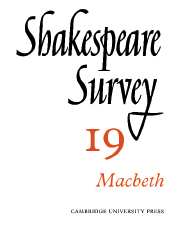Book contents
- Frontmatter
- ‘Macbeth’ in the Twentieth Century
- The Criminal as Tragic Hero: Dramatic Methods
- Antithesis in ‘Macbeth’
- Why was Duncan’s Blood Golden?
- Image and Symbol in ‘Macbeth’
- ‘Macbeth’ and The Furies
- Hell-Castle and its Door-Keeper
- ‘His Fiend-Like Queen’
- The Fiend-Like Queen: A Note on ‘Macbeth’ and Seneca’s ‘Medea
- Shakespeare at Street Level
- New Findings with Regard to the 1624 Protection List
- Shakespeare Productions in the United Kingdom: 1965
- The Royal Shakespeare Company 1965
- The Year's Contributions to Shakespearian Study: 1 Critical Studies
- 2 Shakespeare’s Life, Times and Stage
- 3 Textual Studies
- Index
- Plate Section
‘Macbeth’ and The Furies
Published online by Cambridge University Press: 28 March 2007
- Frontmatter
- ‘Macbeth’ in the Twentieth Century
- The Criminal as Tragic Hero: Dramatic Methods
- Antithesis in ‘Macbeth’
- Why was Duncan’s Blood Golden?
- Image and Symbol in ‘Macbeth’
- ‘Macbeth’ and The Furies
- Hell-Castle and its Door-Keeper
- ‘His Fiend-Like Queen’
- The Fiend-Like Queen: A Note on ‘Macbeth’ and Seneca’s ‘Medea
- Shakespeare at Street Level
- New Findings with Regard to the 1624 Protection List
- Shakespeare Productions in the United Kingdom: 1965
- The Royal Shakespeare Company 1965
- The Year's Contributions to Shakespearian Study: 1 Critical Studies
- 2 Shakespeare’s Life, Times and Stage
- 3 Textual Studies
- Index
- Plate Section
Summary
This is an attempt to see, as if through Elizabethan eyes, the supernatural background of the play and Macbeth’s relation to it. I cannot pretend that this brief study is other than a very rough approximation, because the final impression is really a composite one put together from a wide variety of sources. For good or ill, however, I have ventured into the supernatural world of the Elizabethans because I dislike the ‘character sketch’ approach to Macbeth as much as I dislike the studies of isolated images with their promise of a poetic whole which never quite materializes. Both methods cause fragmentation of the play to such an extent that few commentators nowadays bother much about the Weird Sisters—who or what they ate has become more important than what they do. Perhaps a reluctance to associate Shakespeare with a belief in witchcraft is at the root of this malaise. No one can tell whether Shakespeare believed in hanging witches, but can anyone doubt that he felt the same anxiety about them that obsessed so many of his contemporaries? Shakespeare was no iconoclast like Reginald Scot; Macbeth would certainly not shake a contemporary audience’s belief in witchcraft. I prefer to see in the play the outlines of the same frightful psychic cloud, composed of fear, superstition and religious wrong-headedness, that thundered in the contemporary imagination and destroyed countless thousands of innocent people with its lightning.
- Type
- Chapter
- Information
- Shakespeare Survey , pp. 55 - 67Publisher: Cambridge University PressPrint publication year: 1967



